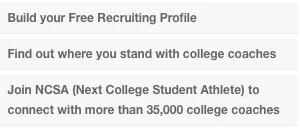Wrestler Starts Music Career Either Too Late or Too Early for NCAA
Joel Bauman, a wrestler for Minnesota, is quitting the sport to pursue his music career which the NCAA says he cannot do in tandem with being a student-athlete:
“I feel like I have a calling,” Bauman said. “I feel like I was put here to make the world a better place. My calling is bigger than a scholarship. My message is bigger than me.”
So why does SMU football signee Myles Crosby have the option to be both a male model and college athlete while Bauman has to choose between wrestling and music? Because Crosby is continuing his modeling while Bauman started promoting his music after his enrollment. From NCAA Bylaw 12.5.1.3:
If an individual accepts remuneration for or permits the use of his or her name or picture to advertise or promote the sale or use of a commercial product or service prior to enrollment in a member institution, continued remuneration for the use of the individual’s name or picture (under the same or similar circumstances) after enrollment is permitted without jeopardizing his or her eligibility to participate in intercollegiate athletics only if all of the following conditions apply: (Revised: 1/14/97, 3/10/04)
(a) The individual’s involvement in this type of activity was initiated prior to his or her enrollment in a member institution;
Bauman was also referencing his status as a college wrestler in promoting his videos and music, which violates another element of the bylaw:
(c) No reference is made in these activities to the individual’s name or involvement in intercollegiate athletics;
This could change in the future though. Here are items from a “points to consider” list that the Rules Working Group sought feedback for last summer. These ideas may be fleshed out and presented to the Board of Directors as formal proposals over the next year or two:
- Among other restrictions, current legislation does not permit student-athletes to use institutional facilities in fee-for-lesson employment and does not permit student-athletes to use his or her likeness to promote a business.
- Deregulation in this area would reduce some administrative burden in monitoring student-athlete employment.
- Permitting student-athletes to use likeness to advertise fee-for-lesson business is consistent with other student employment opportunities (e.g., music lessons).
This does not touch precisely on an athlete’s ability to promote his artistic endevors, but it offers hope. It shows a willingness on the part of the NCAA (or at least the Rules Working Group) to consider allowing athletes to profit off their likenesses in some ways. And if athletes were allowed to go so far as to use their likeness to promote an athletics-based business like private lessons, it stands to reason their might also be allowed to promote a non-athletically related business like recording.


